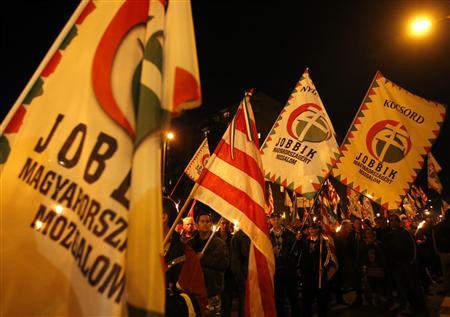The Council of Europe’s ‘European Commission Against Racism and Intolerance‘ (ECRI) published critical reports this week calling for action in Hungary and Poland to fight prejudice within their borders. Although often cited as victims of intolerance in the UK it has been shown that Hungarians and Poles are not immune to the same instincts within their own borders.
Hungary is singled out in particular for anti-Semitism but that is not the only criticism of the country. The ECRI’s Stephanos Stavros told euronews, regarding Hungary: “We have big concerns in connections with hate speech, targeting all the vulnerable groups: migrants, Roma, Jews, homosexuals, transsexuals, and so on. We have issues concerning violence and with Roma integration, Roma children going to the wrong kind of schools, Roma children going to segregated schools.”
With echoes of the “Go Home” anti-illegal immigration vans temporarily employed by the British government in 2013 it is reported by that the Hungarian government’s anti-immigration campaign uses billboards to warn newcomers against taking jobs from Hungarians and to demand respect for the law. In 2014 Hungary received nearly 43,000 refugees, more per capita than any EU country except Sweden.
The popularity of Hungary’s radical nationalist party, Jobbik, is not the only driving force behind domestic extremism. The television channel Echo TV was founded in 2005 and is “favoured among neo-fascists” according to the ECRI. It regularly promotes the leader of Jobbik, Gabor Vona, who once founded a paramilitary group that preyed on the Roma minority. One of Echo TV’s well-known presenters uses his shows to spread anti-Semitic conspiracy theories and on one occasion called Roma “apes.” A regular columnist for the Magyar Hírlap, a pro-government newspaper, has a track record of attacking Jews, who he once called “stinking excrement”.
The report is at pains to clarify that hate speech is not restricted to what are generally regarded as the extremist parties, but in fact it occurs right across the political spectrum. It states:
“As a result of the climate of impunity, derogatory remarks about Roma, Jews, LGBT persons, asylum seekers and refugees have become commonplace in the public sphere. Some media publish or broadcast blatantly racist material, and cyberhate poses a particular challenge.”
The ECRI recommends that Hungary punishes hate speech properly and its leaders should publicly oppose racism and homophobia speech. It also criticises the treatment of Roma people, demanding that a policy banning school segregation should be enacted and that authorities should refrain from forcing Roma from their homes without providing alternative housing.
The ECRI singles out Poland for online Islamophobia and nationalist groups championing traditional Polish values — mainly adherence to Catholicism and a concomitant opposition to abortion and gay marriage. The groups in question organise marches, often allied to 11 November Independence Day celebrations, which have degenerated into violence. The ECRI recommends that Poland comes into line with the European Convention on Human Rights, that the criminal code be reviewed to punish racism and racial discrimination and that the dignity and the equality of LGBT people be enshrined in the Polish law.
The findings of the ECRI not only challenge Hungary and Poland, they also pose a challenge to those countries to which Hungarian and Polish workers move, as permitted by the free movement of persons provided for by the European Treaties. Not only will those countries be asked to guard against their own alleged prejudices, they will in some cases find themselves dealing with the intolerance of others.

COMMENTS
Please let us know if you're having issues with commenting.